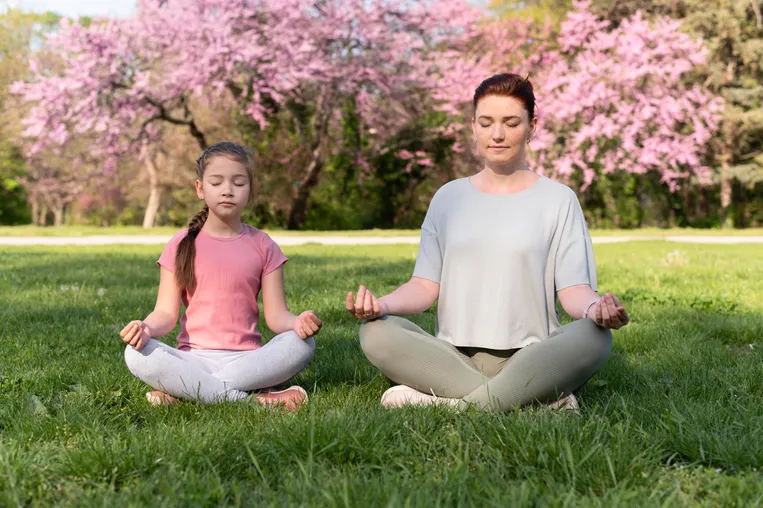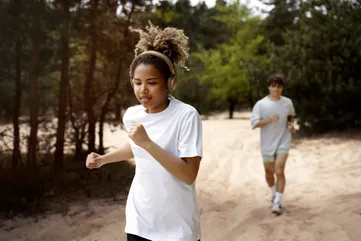
Meditation has long been perceived as a purely spiritual or calming practice, and for many, it is. Although meditation can be traced back as far as 5000 BC in the historical record, its exact origins are unclear. Over the millennia, its influence has transcended religious, cultural, and geographical borders and has recently caused scientists to consider the 'method behind the madness.' Or, more accurately, 'the method behind the calmness.'
Studies have shown the mind-blowing impact of meditation on the brain and the body. Meditation doesn't only help you to 'chill out,' it also primes your brain for learning and protects your body against disease. That's why we at Coachbit have included a meditation practice in our 3-Step Morning Routine-- a set of three morning habits (also known as BrainScrub) built to boost brain health and cognitive performance.
Meditation Improves Focus and Learning
According to Dr. Wendy Suzuki, a neuroscientist at New York University, meditation can help us learn faster and reshape cognitive performance. In 2019 a New York University study examined the benefits of a daily meditation session on a series of participants. The participants listened to a 13-minute guided meditation daily for a duration of eight weeks. Another set of participants listened to a 13-minute podcast daily for eight weeks. The study found that, unlike the podcast listeners, those who meditated daily exhibited enhanced attention and improved working memory and recognition memory.
Research suggests that meditation changes our 'stress circuitry,' or the way our hypothalamic-pituitary-adrenal (HPA) axis functions. This is a circuit of our brain consisting of the prefrontal cortex, amygdala, and hippocampus. Studies have found that meditation increases the volume of the hippocampus and prefrontal cortical regions in the brain.
Areas of the prefrontal cortex are responsible for executive functions such as attention, working memory, and cognitive flexibility. The hippocampus also plays an important role in learning and memory retrieval. To put it simply, meditation 'trains' the 'muscles' in our brain that are responsible for focus, attention, memory, and learning. The more we meditate, the stronger those 'learning muscles' get!
Other studies suggest that changes in resting-state brain activity can explain the improvements in cognitive performance from regular meditation. Resting-state brain activity refers to what happens in the brain when there is an absence of stimulus or a task. Studies have found that long-term meditation increases the prevalence of alpha and theta power during the resting state. Alpha and theta brain waves, most commonly linked to relaxation, are also responsible for cognitive functions such as information processing, learning, and memory.
Meditation for Kids and Teenagers
A 2019 study published in the International Journal of Social Science and Economic Research explored the effect of meditation on the achievement, attention, and memory of high school students in India. The study found that those high schoolers who practiced meditation showed improved memory and greater attention spans. In addition, their academic performance in both areas of language and arithmetic improved significantly.
Another study led by Patricia Broderick, Assistant Research Professor at Penn State University, highlighted the effects of meditation and mindfulness on the well-being of adolescents. The participants in the study who practiced meditation exhibited increased calmness, emotional regulation, and general well-being.
The Health Benefits of Meditation
The participants of the 2019 New York University study who took part in brief daily meditations exhibited a significant decrease in stress and anxiety levels. This aligns with existing research that shows that meditation benefits those with mental health issues by decreasing levels of depression, anxiety, psychological stress, substance abuse, and even physical pain. In patients with anxiety disorders, meditation programs have been found to significantly reduce symptoms of anxiety, depression, and panic for a period of up to three years after initial intervention!
Many scientists have theorized that meditation produces these benefits through the enhancement of emotional regulation and self-awareness. Neurologically speaking, this is due to the circuit-level changes that meditation produces between the prefrontal cortex and the amygdala (responsible for our stress response). Simply put, regular meditation over an extended period facilitates a state of emotional stability.
Meditation also does wonders for the immune and cardiovascular systems. Studies have found that it reduces blood pressure, decreases inflammation, and improves immune function. It also promotes better sleep quality.
Tips for Starting a Meditation Practice (for you or your child)
The great news is that you don't need to meditate for hours on end each day or many months before you can see and feel the results. The cognitive and mental benefits of meditation are immediate, and studies show that meditation practices can, and should, be brief but regular.
Getting started can be scary and even awkward if it's completely new to you. That's why we introduce our students very early on in our program to a simple breathing meditation habit that they practice each morning. At a later stage, if they so wish, they can build on their meditation practice.
1. Start Small
Like with every new habit, starting small is key. Most people know that meditating, much like exercising, is good for them but they 'just don't have time!' It's understandable. These days, mornings in particular can be a rushed and chaotic time for both children and parents. That's not to say that there isn't actually time for it.
Your morning meditation doesn't need to be an hour long, and you don't need to sit alone in a dark room away from the rest of the household.
We recommend starting with just five minutes and slowly building up over time to a 13-minute routine (as the studies suggest).
2. Make it Your Own
Meditation is not a one size fits all practice. The best way to ensure that you build a sustainable meditation habit is to make it your own. Many of our students, for example, struggle to sit still and find a walking meditation practice far more doable. If they walk for ten minutes, we recommend they spend at least five minutes paying attention to the feelings in their body, their breath, the air on their skin, what they can hear, and what they can see.
Others find it far more relaxing and beneficial to meditate while sitting still and wearing comfortable clothes. By experimenting with different methods and ways to meditate, you will soon find out what works best for you and your child.
A few of these include:
1. Breathing meditation
2. Walking meditation
3. Mindfulness meditation
4. Guided meditation
3. Be Kind To Yourself
Learning to meditate can be frustrating for many people as they find themselves distracted, unable to keep still, or interrupted by people and devices. This can be even more difficult for children, who are easily distracted to begin with. These feelings of frustration are normal, and getting distracted is too -- in fact, it's a part of the process.
According to Andrew Huberman, a Neuroscientist and Associate Professor at Stanford University, meditation is not about focus, it's about refocus. "This means that every time your mind drifts is an opportunity to refocus and to build up the circuits for focusing," he writes.
So shift your expectations -- you will become agitated and distracted. But every time you do, and manage to shift your thoughts back to your meditation practice, your brain and body reap the benefits. Your ability to meditate and focus will improve slowly and steadily.
Final Thoughts
The scientific studies into meditation, and why it makes us feel so great, have demystified this ancient practice. The array of benefits that meditation offers for learning, focus, and cognitive performance are just one of the reasons we have included it in the very foundation of our curriculum at Coachbit. We value our students' emotional health as much as their academic abilities, and that's why we also highly recommend meditation as a powerful tool for self-awareness, mood stabilization, and happiness. Remember, just like the other BrainScrub habits, it doesn't need to be perfect -- it just needs to be done.
Recommended Resources:
Daniel Goleman and Richard Davidson, The Science of Meditation: How to Change Your Brain, Mind and Body
Daniel Goleman and Richard Davidson, Altered Traits: Science Reveals How Meditation Changes Your Mind, Brain and Body
Learning to Breathe (L2B) -- A Mindfulness Curriculum for Adolescents.
How many core habits and skills is your child missing?
Take our short quiz and find out.
Take our quiz

_Z5TrlU.webp)
